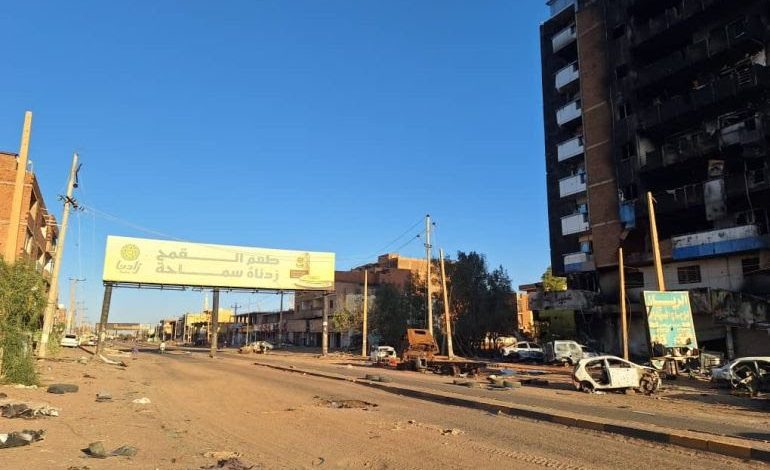A Call to Return: Khartoum, a Capital in Search of Its Residents

Report by Fath Al-Rahman Shubairqa
The official spokesperson for the Khartoum State Government, Al-Tayyib Saad Al-Din, revealed to Al Jazeera Net that a call has been made for residents of Khartoum State to return to their homes, now deemed safe after nearly two years of war that erupted on April 15, 2023.
He stressed that returning is very important to check on homes and secure residential neighborhoods. “No matter how powerful or well-equipped the government is, it cannot secure the entirety of Khartoum State—which stretches extensively—without the presence of its citizens,” he stated.
The government spokesperson acknowledged that citizens would initially face difficulties until the state completes emergency measures to address hardships caused by the Rapid Support Forces (RSF), which had damaged water stations, transformers, cables, and power stations.
While some official estimates put Khartoum State’s population at around 11 million before the war, the spokesperson noted that more than 5 million people had left their neighborhoods. However, he confirmed that return rates are currently high and expected to increase in the coming period.
Al Jazeera Net has documented a steady return of residents since the Sudanese army regained control of Khartoum in late March. Large numbers of buses and vehicles carrying returnees from internal displacement and exile abroad have become a common sight.
Abdel Qader Abdullah, the Sudanese Consul General in Egypt’s southern governorates (Aswan), shared near-official statistics with Al Jazeera Net. According to him, about 114,000 Sudanese citizens voluntarily returned from Egypt between early January and April 20. He added that, after Eid al-Fitr, the average number of daily returnees from Egypt reached around 2,500 people. Over the past year, the total number of returnees reached around 75,000.
Waves of returnees continue to arrive from shelter centers across various states amid celebratory scenes in some cases, sparked by the Sudanese army’s victories that made their return home possible.
Challenges of Return
Returnees face various challenges due to the destruction of infrastructure and loss of property. According to General Yasser Al-Atta, a member of the Sovereign Council and Assistant Commander-in-Chief of the Sudanese Army, Khartoum needs significant support to return to normalcy.
Al-Tayyib Saad Al-Din, the state government spokesperson, added that a major challenge is securing resources to rebuild what the RSF destroyed. He said, “The state lost its financial resources because all revenue-generating sectors—industry, commerce, services, agriculture, and livestock—were disrupted after production halted in Khartoum.”
He emphasized that the state needs both money and time. Discussions have already begun with international organizations to restore basic services, as previous aid focused solely on food, which is no longer sufficient amid growing needs for water, electricity, and essential services following widespread looting.
Despite these challenges, he affirmed that Khartoum is now safe and conducive to return, expecting return rates to rise further as services are restored and residents currently outside the state overcome obstacles related to their families and the academic calendar.
Normalization of Life
In recent weeks, following the army’s control, Khartoum State has witnessed a gradual return of police departments and federal institutions that had relocated to the administrative capital, Port Sudan. More institutions are expected to resume work in Khartoum soon.
On April 10, Interior Minister General Khalil Pasha Sayreen announced the resumption of operations at the ministry’s headquarters on Nile Street in Khartoum, supporting the state’s efforts to normalize life.
Khartoum State Governor Ahmed Othman Hamza said in a press statement after meeting the Interior Minister that “cleansing most areas of the state from rebels has left Khartoum with major challenges, especially restoring vital services looted and destroyed by the rebel militia, and curbing war-induced unrest.”
Meanwhile, several other ministries have started inspecting their premises and assessing damages in preparation to resume operations from the capital. However, concerns persist about health and environmental risks due to war debris and corpses, especially in central Khartoum.
Reverse Migration
The war imposed a harsh reality on Khartoum’s residents, millions of whom remain displaced inside Sudan or refugees abroad, despite the army regaining control of the state.
Some are reluctant to return due to poor environmental conditions, particularly in areas of Khartoum that saw intense fighting and are littered with corpses and organic waste, posing epidemic and health threats. The absence of water and electricity has also led many to remain in displacement areas despite return appeals.
Umm Mohammed, a former resident of an old neighborhood in Omdurman who fled to Egypt during the war, told Al Jazeera Net she quickly returned to Khartoum once the army secured it, hoping to check on and settle in her home. She had struggled with rent in the Faisal district of Giza.
However, she said she couldn’t stay more than two weeks in the city she loves. Her home had been completely looted, and living without property, water, electricity, or other basic necessities was “extremely harsh.” She returned with her children to Egypt, awaiting more stable conditions and service restoration in Khartoum State.
Reported by Al Jazeera Net



